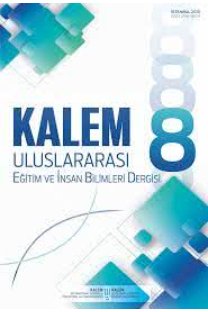Developing the Scales of Parent Reactions for Increasing and Decreasing Students' Study Motivation
Ders Çalışmaya Motive Olmayı Artıran ve Azaltan Ebeveyn Tepkileri Ölçeklerinin Geliştirilmesi
___
Adunyarittigun, D. (1997). Effects of the parent volunteer program upon students' self perception as a reader. U.S. department of education of- fice of educational research and improvement educational resources information center (ERIC). (ERIC Document Reproduction Service No. ED 404617). http://files.eric.ed.gov/fulltext/ED404617.pdfAppleton, J. J., Christenson, S. L. and Furlong, M. J. (2008). Student enga- gement with school: Critical conceptual and methodological issues of the construct. Psychology in the Schools, 45(5), 369-386.
Bandura, A. (1977). Self-efficacy: Toward a unifying theory of behavioral change. Psychological Review, 84(2), 191-215.
Bong, M. and Clark, R. E. (1999). Comparison between self-concept and self-efficacy in academic motivation research. Educational Psycholo- gist, 34, 139-153.
Bower, G. H. and Hilgard, E. R. (1981). Theories of learning (5th. ed.). Eng- lewood Cliffs, NJ: Prentice-Hall.
Bronfenbrenner, U. (1979). The ecology of human development. Cambridge MA: Harvard University.
Chokshi, S. and Fernandez, C. (2004). Challenges to importing Japanese lesson study: Concerns, misconceptions, and nuances. The Phi Delta Kappan, 85(7), 520-525.
Cole, M. (1996). Culture in mind. Cambridge MA: Harvard University.
Collins, W. A. and Laursen, B. (2004). Changing relationships, changing youth: Interpersonal contexts of adolescent development. Journal of Early Adolescence, 24, 55-62.
Çokluk, Ö., Şekercioğlu, G. and Büyüköztürk, Ş. (2010). Sosyal bilimler için çok değişkenli istatistik. Ankara: Pegem Akademi.
Eberly, M. B. and Montemayor, R. (1999). Adolescent affection and help- fulness toward parents: A 2-year follow up. Journal of Early Adoles- cence, 19, 226-248.
Eryılmaz, A. and Mammadov, M. (2016a). Developing the scale of factors increasing study motivation. Journal of European Education, 6(2), 73-87.
Eryılmaz, A. and Mammadov, M. (2016b). Ders çalışmaya motive olmayı azaltan faktörler ölçeğinin geliştirilmesi. Gençlik Araştırmaları Der- gisi, 4(1), 73-99.
Eryılmaz, A. (2012). A model of subjective well-being for adolescents in high school. Journal of Happiness Studies, 13(2), 275-289. doi: 10.1007/s10902-011-9263-9
Eryılmaz, A. (2014). Perceived personality traits and types of teachers and their relationship to the subjective well-being and academic achieve- ments of adolescents. Educational Sciences: Theory & Practice, 14(6), 2049-2062.
Eryılmaz, A. and Ercan, L. (2014). Ergenler için ders çalışmaya motive olma ölçeğinin geliştirilmesi. Başkent University Journal of Education, 1(1), 34-40.
Fredricks, J. A., Blumenfeld, P. C. and Paris, A. H. (2004). School enga- gement: Potential of the concept, state of the evidence. Review of Educational Research Spring, 74(1), 59-109.
Ginsburg, G. and Bronstein, P. (1993). Family factors related to children's intrinsic/extrinsic motivational orientation and academic performance. Child Development, 64, 1461-1471.
Gonzalez-DeHass A. R., Willems, P. P. and Holbein, M. F. (2005). Exami- ning the relationship between parental involvement and student moti- vation. Educational Psychology Review, 17, 99-123.
Greenwood, G. E., and Hickman, C. W. (1991). Research and practice in parent involvement: Implications for teacher education. Elementary School Journal, 91(3), 279-288.
Hulse, S. H., Egeth, H. and Deese, J. (1980). The psychology of learning (5th ed.). New York: McGraw-Hill.
Lane, J., Lane, A. M. and Kyprianou, A. (2004). Self-efficacy, self-esteem and impact on academic performance. Social Behaviour and Persona- lity, 32(3), 247-256.
Marchant, G. J., Paulson, S. E. and Rothlisberg, B. A. (2001). Relations of middle school students' perceptions of family and school contexts with academic achievement. Psychology in the Schools, 38(6), 505-519.
Paulson, S. E. (1994). Relations of parenting style and parental involvement with ninth-grade students' achievement. Journal of Early Adolescence, 14(2), 250-267.
Pintrich, P. R. and Schunk, D. H. (2002). Motivation in education: Theory, research, and applications (2nd ed.). Upper Saddle River, NJ: Prentice Hall.
Reeve, J. (1993). The face of interest. Motivation and Emotion, 17, 353-375.
Ryan, R. M., Deci, E. L. and Grolnick, W. S. (1995). Autonomy, relatedness, and the self: Their relation to development and psychopathology. In D. Cicchetti and D. J. Cohen, (Ed.), Developmental psychopathology (pp. 618-655). New York: Wiley.
Ryan, R. M. and Deci, E. L. (2000). Self-determination theory and the faci- litation of intrinsic motivation, social development, and well-being. American Psychologist (Washington, DC), 55, 68-78.
Ryan, R. M. and Stiller, J. (1991). The social contexts of internalization: Parent and teacher influences on autonomy, motivation and learning. In P. R. Pintrich and M. L. Maehr, (Eds.), Advances in motivation and achievement (Vol. 7) (pp. 115-149). Greenwich, CT: JAI Press.
Schunk, D. H. (1991). Learning theories: An educational perspective. New York: Macmillan.
Slavin, R. E. (2003). Evidence-based education policies: Transforming edu- cational practice and research. Educational Researcher, 31(7), 15-21.
Steinberg, L. (2005). Cognitive and affective development in adolescence. Trends in Cognitive Sciences, 9, 69-74.
Stipek, D. (2002). Motivation to learn: From theory to practice (4th ed.). Needham Heights, MA: Allyn & Bacon.
Trusty, J. (1996). Relationship of parental involvement in teens' career de- velopment to teens' attitudes, perceptions and behavior. Journal of Research and Development in Education, 30(1), 63-69.
Vallerand, R. J., Blais, M. R., Brier, N. M. and Pelletier, L. G. (1989). Construction and validation of the echelle de motivation en education. Canadian Journal of Behavioral Sciences, 21, 323-349.
Vygotsky, L. (1978). Interection between learning and development. Cambridge MA: Harvard University.
Zimmerman, B. and Martinez-Pons, M. (1988). Construct validation of a strategy model of student self-regulated learning. Journal of Educati- onal Psychology, 80, 284-290.
- ISSN: 2146-5606
- Yayın Aralığı: 2
- Başlangıç: 2011
- Yayıncı: Kalem Vakfı Okulları
ELİF BAHADIR, Nur UYGUN, Emine USLU, Hadiye HENDEM
Müdür Yardımcılarının İş Doyumunun Yordayıcısı Olarak Okul Müdürlerinin Mentorluk Fonksiyonları1
Uğur ÖZALP, RAMAZAN YİRCİ, İbrahim KOCABAŞ
Ortaokul Öğrencilerinin Müzik Dersi ve Müzik Öğretmenine İlişkin Algılarının Metaforik Analizi
İlker TEZ, Mehtap AYDINERUYGUN
Supervision in Contemporary and Democratic Education
TUNCAY ÖZDEMİR, H. Nihat BİLGEN
Developing the Scales of Parent Reactions for Increasing and Decreasing Students' Study Motivation
